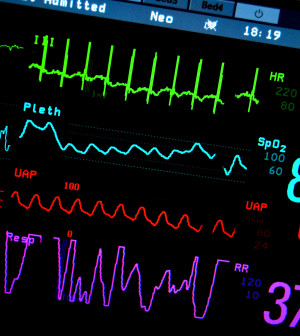- Could Your Grocery Store Meat Be Causing Recurring UTIs?
- Are You Making This Expensive Thermostat Error This Winter?
- Recognizing the Signs of Hypothyroidism
- 10 Strategies to Overcome Insomnia
- Could Artificial Sweeteners Be Aging the Brain Faster?
- Techniques for Soothing Your Nervous System
- Does the Water in Your House Smell Funny? Here’s Why
- Can a Daily Dose of Apple Cider Vinegar Actually Aid Weight Loss?
- 6 Health Beverages That Can Actually Spike Your Blood Sugar
- Treatment Options for Social Anxiety Disorder
A Grateful Heart May Be a Healthy Heart

Being thankful for the good things in life may benefit heart failure patients, a new study suggests.
The research included almost 200 heart failure patients who didn’t yet have any symptoms, such as shortness of breath or fatigue. Halting the disease progression at this point — known as stage B — can prevent it from moving to stage C. In stage C, patients have a five times higher risk for death, according to the researchers.
Patients completed standard psychological tests so researchers could assess the patients’ levels of gratitude and spiritual well-being.
Higher levels of gratitude were associated with better mood, better sleep, less fatigue and less inflammation, a factor that can worsen heart failure, according to the study.
However, it’s important to note that this study was only able to find an association between feeling grateful and improved heart health markers; it wasn’t designed to prove that feeling thankful actually caused the improvements.
The study was published recently in the journal Spirituality in Clinical Practice.
To get a better idea of how feeling thankful might help the heart, the researchers asked some of the patients to keep a gratitude journal for eight weeks. On most days, they were expected to write down three things for which they were most thankful.
And, keeping a gratitude journal seemed to help heart health even more, the study showed.
“We found that those patients who kept gratitude journals for those eight weeks showed reductions in circulating levels of several important inflammatory biomarkers, as well as an increase in heart rate variability while they wrote. Improved heart rate variability is considered a measure of reduced cardiac risk,” study author Paul Mills, a professor of family medicine and public health at the University of California, San Diego, said in a journal news release.
“It seems that a more grateful heart is indeed a more healthy heart, and that gratitude journaling is an easy way to support cardiac health,” he concluded.
More information
The U.S. National Heart, Lung, and Blood Institute has more about heart failure.
Source: HealthDay
Copyright © 2026 HealthDay. All rights reserved.










